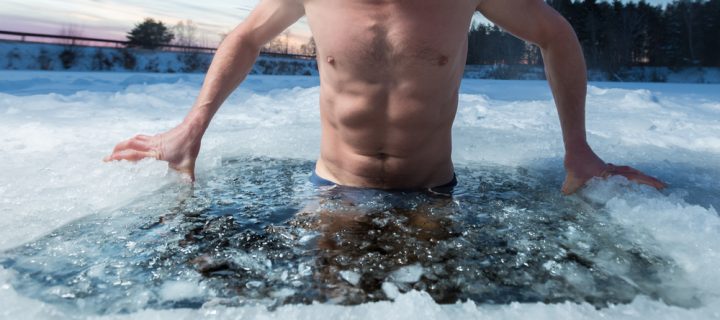Some people swear by and some experts say to avoid it. What should you do?
Taking a bath in a deep tub full of ice cold water: it’s something that most of us would run down the block to avoid doing. A small group of alternative thinkers gravitates towards the practice, however, and some claim, with fantastic results. Athletes, and especially groups like those known as ‘Wim Hoffers’, seem to feel that bathing in ice water has an almost magical effect on our bodies.
Wim Hof is a Dutch motivational speaker known as “The Iceman” who developed the Wim Hof Method. It’s a practice that involves gradually teaching your body to withstand very cold temperatures through exposure to cold water, combined with yoga and meditation. Hof claims cold water immersion can boost your immune system. He also says it can help you battle depression and even face things like arthritis head on. Does it work? Here’s a bit on who’s doing it and what science says.
Athletes Who Cold Plunge
The famous tennis player Naomi Osaka, soccer’s Cristiano Ronaldo, and football’s Terrell Owens are just a few of the famous names in sports jumping into an ice cold tub. Brrr.
Athletes from all walks are plunging into cold water for a quicker recovery. Placing your body in an ice bath constricts your blood vessels in an anti-inflammatory process. Some experts say this helps your muscles flush out exercise waste products such as lactic acid, helping to reduce the oxidative stress associated with a heavy workout.
Bathing in ice water is also said to reduce your pain perception. Because of this, if you’ve just torn a muscle, soaking in extreme cold could also potentially help your mental state. It is a shock to the system that not everyone finds beneficial, however.
What Science Says About Bathing in Ice Water
Some people love it, but some experts are quick to point out that there’s no faster route to active recovery. Your body simply needs time. One study done in 2010 concluded that it was “difficult to ascertain whether the therapy had a significant effect on the muscle symptoms.” The study did recommend that athletes get sufficient rest following a workout, that they stretch, cool down, eat a balanced diet, drink enough fluids, and go for a massage.
Related: All About the New COVID-19 Mutation, Omicron
A second study done in 2016 found that regularly having a hot-to-cold shower routine resulted in a 29% reduction in people calling in sick to work.
Furthermore, a third study done in 2016 found that runners who placed their legs in freezing water had less swelling. There’s a catch, however. Some experts have pointed out that inflammation can be a good thing if your overall goal is to be stronger. Slowing down your body’s natural response to working out could actually be bad for it. One set of researchers found that people involved in strength training over three months who took ice baths experienced smaller muscle and strength gains compared with those who didn’t ice bathe.
The takeaway? It might be good to turn to an ice bath for a quicker recovery, but the practice might stunt the growth of your strength over the long term.
The Unseen Dangers and Benefits of Bathing in Ice Water
Obviously, bathing in extremely cold, freezing waters can be dangerous for your body, apart from healing it, too. Ice water immersion works by shocking your system. It’s important to be careful that it doesn’t trigger arrhythmia, (an irregular heart beat), and that athletes returning from a strenuous workout don’t actually pass out from the sudden change.
Dr. John Tabacco, a sports medicine physician from Virginia told Today.com that you should never get in a very cold bath if you’re feeling dizzy, lightheaded or in an altered mental state. It’s also important that people who live with conditions like Raynaud’s disease avoid ice baths altogether. And finally, of course, you need to watch out for hypothermia. Never stay in an ice bath beyond the recommended amount of time, and always consult with your doctor before beginning the practice.
For more on workout recovery and best practices, click here.
photo credits: Dudarev Mikhail/Shutterstock.com












